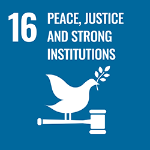About Peace, Justice and Strong Institutions
Promote peaceful and inclusive societies for sustainable development, provide access to justice for all and build effective, accountable and inclusive institutions at all levels.

We work towards the UN's Sustainable Development Goal 16: Peace, Justice and Strong Institutions, to create a better and fairer world.
The 2030 Agenda for Sustainable Development was adopted in 2015 by all United Nations member states. It provides a blueprint for peace and prosperity for people and the planet.
Find out more about our work across all the UN's Sustainable Development Goals.
Promote peaceful and inclusive societies for sustainable development, provide access to justice for all and build effective, accountable and inclusive institutions at all levels.

Most research in international relations remains focused on security issues, mainly in the context of military questions and national intelligence. In line with more recent discussions about broader concepts of security, our Centre for Policy, Conflict and Co-operation seeks to broaden the debate to consider conflict and co-operation more broadly, in both international and domestic society and in relation to environmental and climate change.
The Centre seeks to bring together international and domestic politics and history, environmental management and climate science, policy making and theory, as well as the advancement of professional practice and theoretical developments. It regularly engages with professionals in diplomacy, military, international development, environmental protection and biodiversity conservation and other related areas, both in our teaching and in our research.
Scotland is responsible for observing and implementing international human rights obligations in devolved areas such as health, social security, education, housing and social care. There is a vibrant and dynamic conversation in Scotland about human rights reform. Civil and political momentum has committed Scotland to a path where civil, political, economic, social, cultural, environmental rights are better protected.
Research undertaken by Professor Katie Boyle, with the Scottish Human Rights Commission, has been informing Scotland’s approach to the legal incorporation of the rights into domestic law. Ultimately, this means giving people the opportunity to enjoy their rights and to have routes to effective remedies available if or when their rights are not adequately protected.
Our research enhances peace, justice and strong institutions through close engagement with the following:
The University’s human rights research aims to combine scholarly legal and empirical research with normative analysis to inform lawmaking and policy.
This interdisciplinary programme, taught in partnership with the UN Institute of Training and Research, fosters reflective, informed, justice-focused leadership in international institutions. Students engage closely with the law, philosophy and politics of human rights while also pursuing training in diplomatic and negotiation skills. An integrated internship at a UN agency or a public sector or NGO rights organisation is a key part of the programme. Graduates have gone on to employment in major positions in human rights leadership globally, including across the UN, state civil services and campaigning organisations.
The University’s BA (Hons) Criminology and Social Policy course is ranked first in Scotland (Times and Sunday Times Good University Guide 2025). Taught by experts in their field, the course is informed by the latest developments in social research. Our BA (Hons) Criminology and Social Policy degree enables students to understand a wide range of social issues, including crime and criminal justice, poverty, inequality, discrimination, welfare, race, immigration, disability, addictions, youth and ageing. We give students the skills to research, analyse and assess the key issues independently. Students will benefit from the institutions strong research links with on-campus organisations such as the Scottish Centre for Crime and Justice Research, the Scottish Institute for Policing Research, the Salvation Army Centre for Addiction Services and Research, and the Dementia Centre.
The Scottish Political Archive sits within the division of History, Heritage and Politics and was created by University of Stirling researchers in 2010 to explore the referenda of 1979 and 1997. Because of its fundamental aim to support a research question, SPA practises contemporary collecting, actively filling in gaps in the historical record and collecting around specific topics to avoid future gaps.
The archive is home to oral history interviews, the personal papers of prominent Scottish politicians and associated material relating to contemporary Scottish politics. SPA also aims to collect material and archives from Scottish political organisations, grassroots activism and standalone campaigns in order to chronicle the political history of Scotland in the twentieth and twenty first centuries.
The University acknowledges that it has a duty to take a robust approach towards eradicating slavery and human trafficking in its business and throughout its supply chains and recognise that modern slavery is a significant global human rights issue. The University is a signatory to the SDG Accord, the University and College sector’s response to the United Nations Sustainable Development Goals (SDGs).
The University welcomes the opportunity to examine all operations and practices where the University community can help to ensure that all people are free from lives of all forms of slavery. The University’s annual statement reports the actions the University has taken in the last financial year and explains what will be done in the future.
The Scottish Centre for Crime and Justice Research is a multi-institutional partnership, including the University of Stirling, that aims to produce high quality, internationally recognised research in relation to crime and criminal justice. The SCCJR works with communities, policy makers and the wider public to collaboratively build just societies and supports the development of criminological research capacity across Scotland and provides an inclusive forum for this.
The Salvation Army Centre for Addiction Services and Research was established in February 2017 to take forward the Salvation Army (TSA) Drug and Alcohol Strategy (SDAS) through collaborative working between TSA and the Faculty of Social Sciences in the University of Stirling. The Centre delivers a range of benefits including policy analysis to inform the work of the Salvation Army and training for front line Salvation Army workers through short courses, workshops and stand-alone accredited modules.